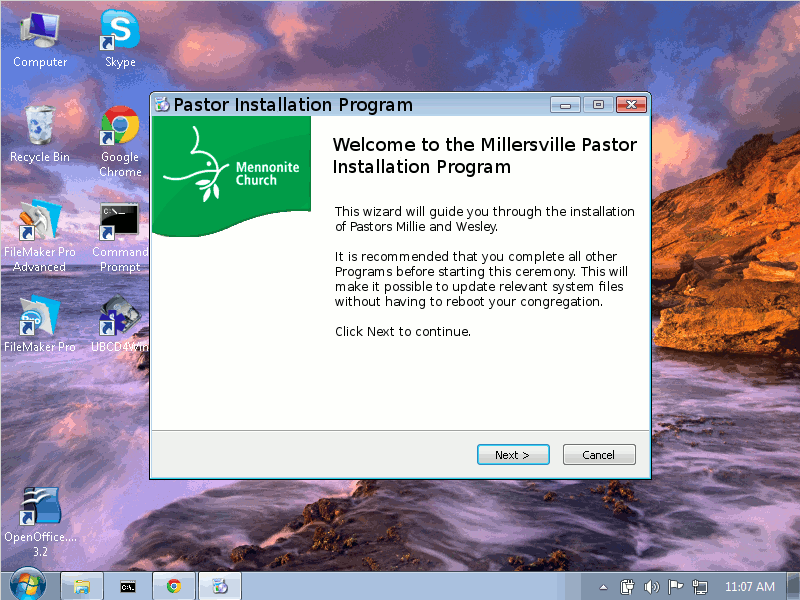From 2015 to 2018 I preached a series of messages on the Confession of Faith in a Mennonite Perspective. This messaged was preached in 2017. Article 15: Ministry And Leadership.

Canadian Geese flying in v-formation take turns being in the lead. An interesting model of leadership when everyone knows where they are going.
Paragraph 1: We believe that ministry continues the work of Christ, who gives gifts through the Holy Spirit to all believers and empowers them for service in the church and in the world. We also believe that God calls particular persons in the church to specific leadership ministries and offices. All who minister are accountable to God and to the community of faith as they serve the church.
To say it another way: Jesus had a mission which he gave to the church to continue and the church has been given gifts of leadership to do this work. While the Mennonite church doesn’t say how our leadership structure needs to look, we do need official leaders. Both the leaders and the congregation as a whole are accountable to God, and Matthew 25 describes the essence of how this accountability looks:
“The King will reply, ‘Truly I tell you, whatever you did for one of the least of these brothers and sisters of mine, you did for me.’
Matthew 25:40 NIV
Mennonites are different from denominations like the Catholic church which have a significant hierarchy, our structure looks more flat, we don’t have a strong authority like the Pope. We are also distinguished from the other extreme of no hierarchy, like Quakers, by recognizing the need for church officials that represent the congregations and make decisions.
Mennonites have a middle of the road approach to leadership which has it’s advantages in that churches can be flexible to adjust to the times we live in and yet have enough structure to provide a framework for churches to operate predictably. There are disadvantages too, the biggest of which is that it isn’t always clear who does what and who makes the final decision or how a final decision is made. It can be frustrating and confusing.
My understanding of leadership in the Mennonite church has been that anyone can be a leader, everyone is expected to lead in some way, but only a few are called to fill the official roles of church leadership.
Priesthood of all believers
In the old covenant, only Levites could become priests. In the new covenant, all believers are priests.
Paragraph 2: Christ invites all Christians to minister to each other in the church and on behalf of the church beyond its boundaries. Christ enables them for ministry in response to specific needs and opportunities. Such service is a participation in God’s creative work of building up the body of Christ in love and of witnessing to God’s righteousness in the world.
In 2012, Millie and I attended a leadership seminar and one of the important concepts that I learned was leadership competency. How many people can a person lead? And this is an important question because while we believe everyone is capable of leading and anyone can lead not everyone is able to lead in every role. We recognize that a person’s character and values enable them to lead groups of varying sizes and for different lengths of time.
Every person in the world is expected to be a leader in their own family. Parents are leaders, in the most basic way. In the family, parents are expected to be spiritual leaders to their family. Not everyone is capable enough to represent a congregation or be a bishop in the conference, but everyone is expected to lead in some fashion and contribute to the ministry of the church at some point in time.
This is reflected in our own church structure in the following way: Millie and I would be considered the representational leadership of the congregation, where we fill paid positions, having a calling that was confirmed by the congregation and our conference, but it doesn’t mean we make all the decisions. Our church has a number of important committees including: The ministry team, Church council, stewardship committee, the trustees and the Vision and discernment committee that carry the burden of decision making on behalf of the congregation outside of our 2 annual congregational meetings. It’s within these committees that we try to benefit from and nurture our leadership gifts that God has given to the church to allow our church to mature and do the ministry God has called us to.
A couple of weeks ago, Millie preached on the topic of the five fold ministry. What is interesting is that this article in our Confession of Faith references the five fold ministry scripture twice. The same scripture is also mentioned in our Church’s constitution. It is, therefore, an important scripture to us with regards to leadership and ministry:
So Christ himself gave the apostles, the prophets, the evangelists, the pastors and teachers, to equip his people for works of service, so that the body of Christ may be built up until we all reach unity in the faith and in the knowledge of the Son of God and become mature, attaining to the whole measure of the fullness of Christ.
Ephesians 4:11-13 NIV
Paul’s message in Ephesians 4 is that leadership is needed to bring maturity to the church and that there are 5 ways that the church needs to be led so that we can become mature. Every person typically exhibits one or two of these leadership gifts.
For a church to be successful in leadership, it needs two things in it’s leadership: (1) Leaders that are competent at leading a congregation and (2) that there is enough diversity in leadership gifts that represent the 5 types of leadership. We are normally good at finding competent leaders, but we have rarely tried to balance our leadership teams with the appropriate gifts.
There are 2 important things that happen when everyone takes a turn at leading: The first is that everyone’s gift of leadership is used to benefit the church which is what Jesus intended for us to do and the second is that everyone learns to understand the pressures and expectations of leadership and they are able to sympathize better with their leaders.
Expectations for our leaders

Leadership is like driving in a winter storm at night. It’s much easier being in a vehicle following another car down the road, it’s very difficult being the lead car.
Paragraph 3: The church calls, trains, and appoints gifted men and women to a variety of leadership ministries on its behalf. These may include such offices as pastor, deacon, and elder as well as evangelists, missionaries, teachers, conference ministers, and overseers. The character and reputation of leaders is to be above reproach. Following the example of Christ, persons so appointed preach and teach with authority, interpret the Scriptures and the faith diligently, speak divine truth with boldness, equip the saints, relate with compassion to the needy, and lead the congregation in faithful living, so that the church may be “built together spiritually into a dwelling place for God.”
In summary: leaders should be very close to perfect in every way possible. As the early church grew, Paul recognized that while certain people were capable of being leaders, they weren’t necessarily the people you wanted representing the church. What Millie and I do and say reflects on you. When we are publicly acknowledged for doing good, it reflects well on you. If we do something that is shameful, the whole congregation is shamed. Millie and I are public figures in a small way and so we always need to remember that we represent you. And while we represent the congregation, we are ultimately accountable to God first:
“When the Son of Man comes in his glory, and all the angels with him, he will sit on his glorious throne. All the nations will be gathered before him, and he will separate the people one from another as a shepherd separates the sheep from the goats. He will put the sheep on his right and the goats on his left. “Then the King will say to those on his right, ‘Come, you who are blessed by my Father; take your inheritance, the kingdom prepared for you since the creation of the world. For I was hungry and you gave me something to eat, I was thirsty and you gave me something to drink, I was a stranger and you invited me in, I needed clothes and you clothed me, I was sick and you looked after me, I was in prison and you came to visit me.’ “Then the righteous will answer him, ‘Lord, when did we see you hungry and feed you, or thirsty and give you something to drink? When did we see you a stranger and invite you in, or needing clothes and clothe you? When did we see you sick or in prison and go to visit you?’ “The King will reply, ‘Truly I tell you, whatever you did for one of the least of these brothers and sisters of mine, you did for me.’
Matthew 25:31-40 NIV
In the end, we will all sit before the throne of our Lord Jesus and we will give account. When sitting before the throne of Jesus, how important will it be that every Sunday morning worship started on time and we all sang on key? Will it matter how many messages I preached? As leaders, it is important to always remember what is most important to the heart of God and for God it is the least and the lost that matter to him most.
There are a lot of details that need to get done to do the job well, but it is always important for us to remember the big picture and how we will give account before the throne of Jesus.
Ordained

For our installation service, I had created this series of slides. During the software installation, the program asks if you’re really sure you want to proceed. I hope it isn’t too distracting.
Paragraph 4: The confirmation of the call to a particular ministry is a sign of mutual accountability between the church and its chosen representative. A time of discernment may be followed by ordination or a similar act, accompanied by laying on of hands. This act symbolizes the person’s responsibility as a servant of the Word. The congregation and the wider church or conference share in this act as an indication of their blessing and support and as a reminder of the person’s accountability before God and the church, and of the church’s responsibility toward the person.
Before becoming pastors, Millie and I went through a time of discernment. Discernment is an important process, but we use it for more than just the pastor role. Any role that carries significant representation. We do discernment for our missionaries before going on missions. They also represent us and they require discernment and commissioning for ministry.
There are a number of positions in our congregation aside from the pastor role that have a discernment process. In the coming year, we will need to begin the process for electing a new elder to represent the congregation on the Ministry Team which is an important role within our church.
In addition to discerning and commissioning, there is another formality that can happen at the conference level called “ordination” that adds significance to a person’s ministry calling within the wider church. Someone who is ordained gains a more permanent leadership within the conference.
Millie and I are licensed for ministry here at Millersville. We haven’t been ordained. We have considered ordination, but have never thought of it as a priority. Essentially, ordination would enable Millie and I to more easily become a pastor of another congregation, but since we have no intention of pastoring another congregation, we have not considered ordination a priority. It is a question I leave with you: Do you consider it important that Millie and I be ordained?
Blessings and woes of leadership
Failures are embarrassing and one of the more difficult aspects of leadership. Some leaders acknowledge their failures, some pretend that nothing bad happened.
“Woe to you, teachers of the law and Pharisees, you hypocrites! You shut the door of the kingdom of heaven in people’s faces. You yourselves do not enter, nor will you let those enter who are trying to.”
Matthew 23:13 NIV
Jesus’ strongest words were against leaders of the Jewish faith who had failed to lead. Failure is a part of leadership, but the teachers of the law and Pharisees did not acknowledge their own failure. Among the most humbling, embarrassing and difficult tasks of leadership is failure. It has been hard on both Millie and I to see our own weaknesses exposed in our failures to meet expectations and goals.
Millie and I started in June 2012, so we are almost at 5 years of ministry. One of our chief focuses has been leadership development. Both Millie and I have led huddles where the main goal is to develop “discipling leadership skills” within our congregation. Or, in other words, to make leaders who can disciple others to lead.
One of the biggest threats to the church is leadership burnout. Having people lead for too long without enough support so that they get to the point where they’re too tired to ever lead again. We have been trying to lead in a way that is sustainable and to make the experience of leading a blessing. The hope is that when someone has finished their term in a leadership position, they leave with the feeling that after a break, they will want to come back to leading again, not because they have to, but because it was good. Leadership is always hard work, but when it is done right, it can be good. A blessing to the people you lead and to yourself.
Millie and I have felt the blessing of leadership, mostly in that we constantly have people praying for us. We are blessed by your support. Where would we be without it? Millie and I thank you for blessing us. We have also felt the hardship of leadership. There are many times that we do not feel competent for the job we are called to.
And yet, in the end, I would recommend this job to others, it is hard, but it is also good. I would say that if you are ever called to lead, say “Yes”. The blessings outweigh the woes. Jesus has given us each gifts for leadership. The best thing that you can do with a gift that Jesus gives you, is to open it up. Mennonites often shy away from leadership, but to do that is like bottling up the power of the Holy Spirit. Respond to the call to lead, because then you can see the power of God work through the gifts he has given you.